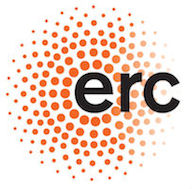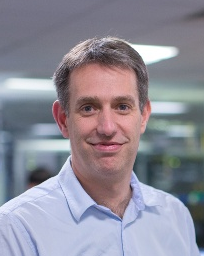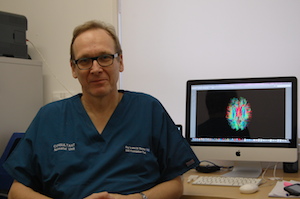Principal Investigators
The aims of the dHCP are ambitious and require substantial scientific and technical advance in several fields. To achieve them the project brings together four principal investigators to provide a unique constellation of complementary skills and techniques. As their publications demonstrate, the PIs have collaborated ad hoc in smaller groups for over a decade, but connectomics research requires more comprehensively collaborative approach. The integrated activity across the Oxford Centre for Functional Magnetic Resonance Imaging of the Brain (FMRIB) and the Centre for the Developing Brain (CDB) provides unparalleled strength in breadth and depth, combining methodology in acquisition and analysis with a clinical capacity to recruit, care for and study a uniquely fragile population.
Professor Stephen Smith
Functional Magnetic Resonance Imaging of the Brain (Oxford University)
Professor Stephen Smith is Professor of Biomedical Engineering and the Associate Director at The Oxford University Centre for Functional Magnetic Resonance Imaging of the Brain (FMRIB). The Analysis Group, which he created in 1997, carries out brain image analysis and statistics research: image reconstruction, artefact removal, motion correction, image and signal filtering, registration, 4-dimensional statistical modelling, diffusion morphometry and tractography, segmentation, structural brain change mapping and pathology analysis. The Analysis Group also provides the tools, environment and training for FMRI and MRI analysis, supporting a large number of imaging applications researchers. It has produced the brain image analysis software package FSL (FMRIB Software Library) which is widely used in many laboratories internationally. He is a major partner in the $30m National Institutes of Health HCP.
Professor Daniel Rueckert
Biomedical Image Analysis Group (Imperial College London)
Professor Jo Hajnal
Centre for the Developing Brain (King’s College London)
Professor David Edwards (corresponding PI)
Centre for the Developing Brain (Kings College London)
Professor David Edwards is Director of the CDB at Imperial and Kings Colleges, and with Jo Hajnal developed the world-first neonatal MR suite at Imperial and now a 2nd facility at Kings College. David Edwards was appointed the foundation Weston Professor of Neonatal Medicine in 1992, and since then has headed the Weston Group whose aim is to reduce the number of newborn infants who grow up with problems caused by brain injury in the newborn period. He is Associate Director of the National Institute for Health Research Medicines for Children Research Network, and a Senior Investigator in the National Institute for Health Research. His research Interests include: Neuroinformatic analysis of the causes and consequences of prematurity Infection, immunology and brain injury, Molecular imaging of inflammation and cell tracking, Translational research in neural rescue therapies, Stem Cell research.





